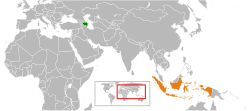
Hungary–Indonesia relations refer to bilateral relations between Hungary and Indonesia. The two countries established diplomatic relations in 1955. A Hungarian embassy was opened in Jakarta in 1957. In line to Hungarian "Eastern Opening" policy, and due to Indonesian political weight and market potentials, Hungary considered Indonesia as one of the most influential states in the ASEAN. While Indonesia sees Hungary as a potential market and a strategic entrance to penetrate the markets of Central Europe and Eastern Europe. Hungary has an embassy in Jakarta, while Indonesia has an embassy in Budapest.
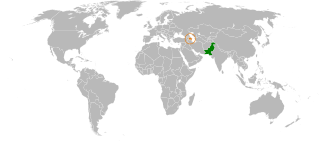
Azerbaijan–Pakistan relations refer to bilaterial relations between the Republic of Azerbaijan and the Islamic Republic of Pakistan. Pakistan has an embassy in Baku and Azerbaijan has an embassy in Islamabad. Both countries are enhancing contact between their respective capitals. The two nations are considered "strategic partners".

Argentina and Indonesia established diplomatic relations in 1956. Since then, bilateral relations between both countries have become increasingly more strategic. According to Argentine Ambassador to Indonesian Javier A. Sanz de Urquiza, Indonesia has been a "true friend of Argentina" over the Falkland Islands sovereignty dispute. Argentina has an embassy in Jakarta, while Indonesia has an embassy in Buenos Aires. Both countries say they share the same values regarding the international order, and the same aspiration to defend the developing nations' interest in international forum. Both countries are members of Group of 77, the G-20 major economies, the G20 developing nations, and Forum of East Asia-Latin America Cooperation.

Azerbaijan–Japan relations are the bilateral relations between the Republic of Azerbaijan and Japan in the political, socio-economic, and cultural fields.
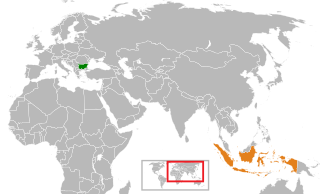
Bulgaria and Indonesia established diplomatic relations in 1956. Bulgaria has an embassy in Jakarta while Indonesia has an embassy in Sofia.
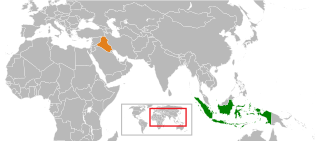
Indonesia and Iraq established diplomatic relations on 27 February 1950 when President Sukarno appointed Bagindo Dahlan Abdullah, a member of the Central Indonesia National Committee, to serve as the ambassador of the United States of Indonesia to Iraq, Syria, Lebanon, and Jordan with a permanent residence in Baghdad. Diplomatic relations are important since they share similarity as Muslim majority countries. As they were established in 1950 from Indonesia embassy in Baghdad, while Iraq has an embassy in Jakarta. Both nations are members of the Non-Aligned Movement and Organisation of Islamic Cooperation (OIC).

The nations of Indonesia and Mexico established diplomatic relations in 1953. Both nations view their counterpart as strategic partners in each other's regions; Indonesia in Southeast Asia and Mexico in Latin America. Both nations are mutual members of the Asia-Pacific Economic Cooperation, Forum of East Asia-Latin America Cooperation, Group of 15, G20, MIKTA, United Nations, and the World Trade Organization.
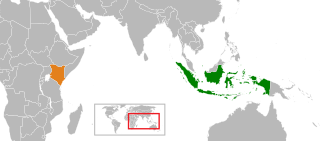
Indonesia and Kenya established diplomatic relations on 15 October 1979. Indonesia has an embassy in Nairobi, also accredited to the Democratic Republic of the Congo, Somalia, and Uganda. On 18 March 2022, Kenya established its embassy in Jakarta. Both nations are partners in multilateral organizations, such as the World Trade Organization (WTO), Non-Aligned Movement and the Indian Ocean Rim Association.

Indonesia and Morocco established diplomatic relations in 1960. Both are the Muslim-majority countries; Indonesia is the most populous Muslim country in the world, while Morocco is also a Muslim majority nation. Morocco praised Indonesia as a strong democratic nation, and pointed out that both nations face the same challenges of separatism and terrorism. Diplomatic relations were established in 1960. Indonesia has an embassy in Rabat and a consulate in Casablanca, while Morocco has an embassy in Jakarta. Both nations are members of the World Trade Organization (WTO), Group of 77, Non-Aligned Movement and Organisation of Islamic Cooperation (OIC).
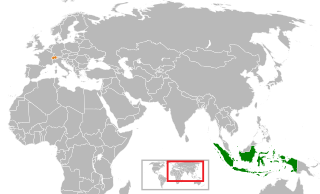
Indonesia and Switzerland established diplomatic relations in 1952. In 2010, the heads of state of the two countries agreed to launch negotiations on a Comprehensive Economic Partnership Agreement (CEPA). Switzerland has named Indonesia as one of seven priority countries for economic development cooperation. Indonesia has an embassy in Bern, while Switzerland has an embassy in Jakarta, also accredited for East Timor and ASEAN.

Foreign relations exist between Azerbaijan and Malaysia. Azerbaijan has an embassy in Kuala Lumpur, while Malaysia has an embassy in Baku. Both countries are members of the Group of 77. Relations are close because the both countries are both secular Muslim-majority states with an increasing number of Christians.

Indonesia–Kuwait relations were officially established on February 28, 1968. The relations focused on economy and trade sectors, especially on energy (oil) and human resources. Kuwait has an embassy in Jakarta, while Indonesia has an embassy in Kuwait City. Both countries are the member of Organisation of Islamic Cooperation and Non-Aligned Movement.

Ecuador–Indonesia relations refer to bilateral relations between Ecuador and Indonesia. Relations were established on 29 April 1980; however, it was not until November 2004 that Ecuador established its embassy in Jakarta, and reciprocating 6 years later on November 11, 2010, that Indonesia finally opened its embassy in Quito. Both countries are the members of Forum of East Asia-Latin America Cooperation and Non-Aligned Movement.

Indonesia–Sudan relations was officially established in 1960. In February 2012, during a visit of Sudanese Foreign Minister Ali Karti to Jakarta, Indonesia and Sudan has agreed to foster bilateral relations in politics, science, education and economic sectors. Indonesia has an embassy in Khartoum, while Sudan has an embassy in Jakarta. Both countries have Muslim-majority populations and are members of Organisation of Islamic Cooperation and Non-Aligned Movement.

Indonesia–Panama relations was established on 27 March 1979. Since the beginning, both countries have realized the strategic importance of each counterpart; Indonesia sees the strategic and geographic importance of Panama as their gate to Central America as well as to reach the Caribbean region, while Panama has also recognized the strategic importance of Indonesia in ASEAN. Indonesia has an embassy in Panama City, while Panama has an embassy in Jakarta.

Indonesia–Kazakhstan relations refer to bilateral relations between Indonesia and Kazakhstan. The two countries officially established relations in 1993 and share some similarities; both countries possess abundance of natural resources, have predominantly Muslim populations with significant Christian minorities, ensure harmonious diversity and a commitment to human rights and democracy. Both nations have agreed to increase cooperation in several economic sectors, such as agriculture, industry, pharmaceuticals, petroleum, transportation infrastructure and machinery manufacture. Indonesia has an embassy in Astana, while Kazakhstan has an embassy in Jakarta. Both nations are members of the Asia Cooperation Dialogue, Organisation of Islamic Cooperation and the United Nations.

Indonesia and Serbia maintain diplomatic relations established between Indonesia and SFR Yugoslavia in 1954.

Current and historical relations between Argentina and Azerbaijan have existed for decades, since Argentina's recognition of Azerbaijan on 9 March 1992.

Azerbaijan–Libya relations refer to bilateral relations between Azerbaijan and Libya. Libya has an embassy in Baku. Azerbaijan has a non resident embassy in Cairo.

Armenia–Indonesia relations refer to foreign relations between Armenia and Indonesia. Both nations are members of the Asian Development Bank, the World Trade Organization and the United Nations.
